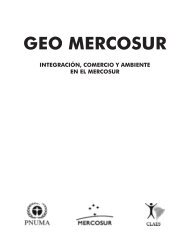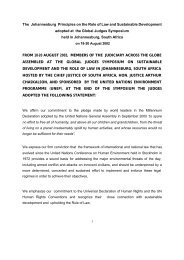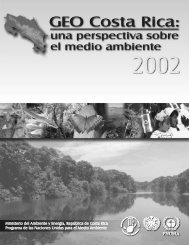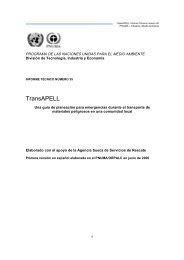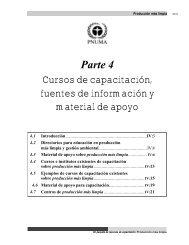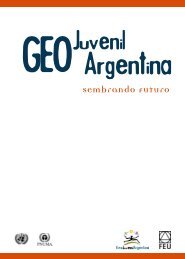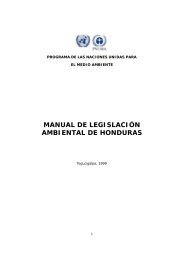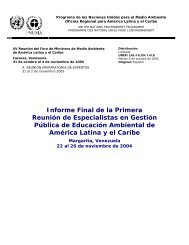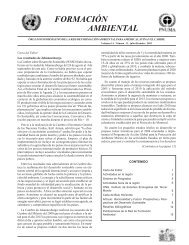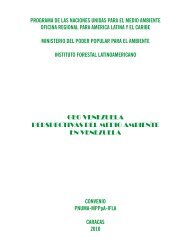GEO Haiti 2010
GEO Haiti 2010
GEO Haiti 2010
You also want an ePaper? Increase the reach of your titles
YUMPU automatically turns print PDFs into web optimized ePapers that Google loves.
<strong>GEO</strong> HAITI • <strong>2010</strong><br />
130<br />
treatment of run-off and wastewater, as well as of<br />
solid waste and excreta (UNICEF, 2008).<br />
Sanitation is therefore essential to public health and<br />
in the struggle against a large number of diseases<br />
attributable to an unhealthy environment. It<br />
ensures the disposal and treatment of wastewater<br />
and excreta, thereby reducing environmental and<br />
health hazards.<br />
Public and private sanitation in <strong>Haiti</strong> is generally<br />
inadequate, and the development strategies,<br />
adopted by the <strong>Haiti</strong>an governments in the 70’s<br />
and 80’s, have not successfully improved the<br />
standard of living (UniQ and CHSRH, 2000). On<br />
the contrary, in the early 1990’s, the economic<br />
slump and widespread poverty resulted in a<br />
degraded environment and the poor provision<br />
of basic services in water and sanitation.<br />
Furthermore, with globalisation, <strong>Haiti</strong> now<br />
consumes a surprising amount of imported<br />
products contributing to an unprecedented<br />
proliferation of waste which adds up to the<br />
diverse sanitation and environmental problems<br />
the country was already facing.<br />
8.3.1 Waste<br />
a) Types of Waste<br />
In industrialised countries, waste is generally<br />
classified empirically on the basis of five main<br />
complementary approaches (Mehu and Grelier-<br />
Volatier):<br />
1) Dangerous or presumed harmless (hazardous,<br />
toxic, non-hazardous, inert waste etc.);<br />
2) Source (by sector or industrial activity, sole<br />
generating operation, associated product).<br />
Categories include:<br />
• Household waste<br />
• Municipal waste<br />
• Medical waste<br />
• Industrial waste<br />
• Agricultural waste<br />
3) Characteristics (inflammable, fermentable etc.)<br />
often associated with one or more possible<br />
sub-types;<br />
• Organic waste<br />
• Inorganic waste<br />
4) Nature or content (plastics, arseniccontaminated<br />
waste, paint waste etc.);<br />
5) Regarding consumer goods, the purpose of<br />
the product before the “end of its useful life”<br />
(batteries, solvents, packaging).<br />
Developing countries, including <strong>Haiti</strong>, tend to<br />
produce little industrial waste and the other<br />
types of waste are composed at least by 70% of<br />
organic materials.<br />
b) Solid Waste Disposal<br />
Around 3,500 m³ of household waste is generated<br />
per day in Port-au-Prince and 600 m³ per day in the<br />
other eight large towns: Cap-Haïtien, Gonaïves,<br />
Les Cayes, Saint-Marc, Verrettes, Jeremie, Port-de-<br />
Paix and Limbe 57 (Thonart et al. 2002).<br />
Although attitudes seemed to be evolving, the<br />
general public does not seem to consider waste<br />
collection and its effective, environmentallyfriendly<br />
treatment as a hygienic, environmental<br />
and socio-cultural necessity. As a result, waste<br />
management is still in its early stages and<br />
everything remains to be done. In 1998, Jean-<br />
Marie Binette stated that “30 to 50% of the<br />
capital’s waste is collected and sent to the only<br />
exiting landfill, Truitier”, and the “50 to 70% which<br />
is not collected is dumped into sewers, gullies or<br />
on street corners or simply burnt in the streets<br />
and in unregulated dumps.” According to the<br />
Ministry of Environment, only 35% of urban waste<br />
is systematically collected (MDE, 1998). In 2005, it<br />
increased to 42% in Port-au-Prince. According to a<br />
study done by Willerval in 2006, in the secondary<br />
cities, only 39% of the waste is disposed of.<br />
In <strong>Haiti</strong>’s cities, waste management is essentially<br />
carried out by the State through City Councils or<br />
57<br />
http://www2.ulg.ac.be/cwbi/projets/atlas/pays/<strong>Haiti</strong>/haiti.htm



